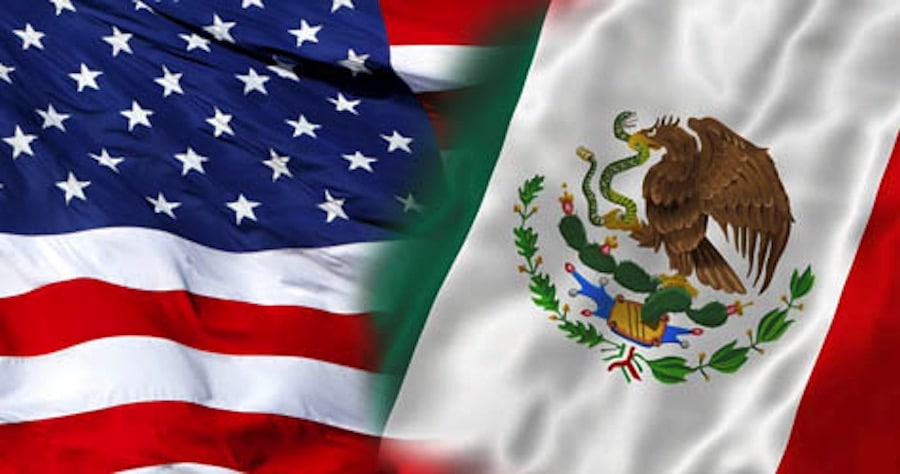This article was translated by John R. Bopp
The fact that we can’t even imagine the influence that the recently elected President of the US is going to have on everything goes without saying. It’s not something we can figure out the day after the election, and we don’t want to think about what it will be like when he’s actually sworn in and takes the reins.
One of the obsessions this candidate had during the campaign was the relationship with the US’s southern neighbor, Mexico.
Curiously, knowing that a significant part of the current territory of the US was once Mexican land, until it changed hands after a war, it seems strange how the US businessman-cum-politician is worried about the increase of the Mexican population in America.
There’s a school of thought that expects the worse for the Mexican economy if the US begins a period of closing borders to people and products (we imagine the goal would only be to close them for those trying to come in).
We found an article on the Harvard Business Review (the prestigious management magazine of the Harvard Business School) by university professor (and world-renowned management guru) Alejandro Ruelas-Gossi, who is of the opposite opinion.
His line of argument is based on the idea that a change in the economic and commercial relationship between both countries could be what Mexico needs to modernize its economic and productive structure, which is currently based on supplying its neighbor to the north with raw materials or unskilled services. Undoubtedly, a change like this would cause problems in the short- and medium-term, but it could be, should the necessary social will exit, the catalyst for a productive, economic, and social transformation of that country.
The article’s author sets out three other economies which have been able to get ahead and make a place for themselves thanks to planning, R&D, public-private collaboration, and a major effort focused on improving and introducing greater added value in the production processes. The models he included were the dairy industry in New Zealand, the steel industry of the Basque Country, and the copper industry in Chile.
It’s definitely flattering that the economy of your country is set out as a model for another, and we’ve seen this before, with Austria, or with all of Latin America and the Caribbean, for example.
But beyond the pride one might feel reading this, it seems that there is a much deeper and more important level: valuing the initiative that the society of the Basque Autonomous Community specifically, and all Basques in general, to support “world-class research and innovation at a local level”.
When, less than 30 years ago, the leaders of the Basque institutions announced their plans and projects to foment the creation of an aeronautical, bioscience, wind power, etc. industry in our country, a large part of the “living forces” (political parties, labor unions, media, “intellectuals”, etc.) of Basque society found the plans empty of content, “fireworks” to distract people from the tough economic situation they were going through. Today, all of the above are thriving industries, an international role model, and we’re still waiting for someone, anyone, to admit their mistake. We won’t be holding our breath.
The article is worth reading. It’s not complicated or tedious. It has the enormous virtue of being more full of “common sense” than economic theory. We’ve spent years immersed in “economic theories” that are taking Europeans (and almost the whole world) to the edge of the abyss, meaning that we’re, at the same time, going through a void of common sense in the decision-making spheres of politics, economics, and industry.
But what can be expected when the economic leaders of half of Europe claim that running a country’s economy is like running a home economy, reducing the skills and abilities of a society or a country and the common European institutions to those of a homemaker? And they say it completely unfazed, keeping a straight face while telling that joke.
Update: We’re including an interview in which the article’s author talks specifically about Basque industry.
Harvard Business Review – 9/11/2016 – USA
Why Mexico’s Economy Doesn’t Depend on the Next U.S. President
The Mexican peso initially fell 13% in trading after Republican Donald Trump won the U.S. presidency in a surprise result over Democratic nominee Hillary Clinton. It was the biggest drop for the currency since an economic crisis in 1994. President-elect Trump has threatened to rip up and renegotiate Mexico’s most important free-trade agreement: NAFTA. The Trans-Pacific Partnership that would have linked Mexico in a free-trade agreement with the United States and 11 other countries is now as good as dead. To be sure, these roadblocks to further trade and investment will damage Mexico’s economy in the short and medium terms. However, I fear that Mexico continuing its existing trade-based economic strategy will not necessarily produce different results in the long term — as it wouldn’t for any other developing country.
(Continue) (Automatic Translation)
Fomento San Sebastian – 6/2014 – Euskadi
Alejandro Ruelas-Gossi
“Ya no se venden productos, se transmiten historias”- Dentro de la agenda de divulgación del proyecto Talent House de Fomento de San Sebastián, Alejandro Ruelas-Gossi profesor de Estrategia en la Adolfo Ibáñez School of Management de Miami, impartió una conferencia sobre la gestión empresarial.
(Continue) (Automatic Translation)
Last Updated on Dec 20, 2020 by About Basque Country





